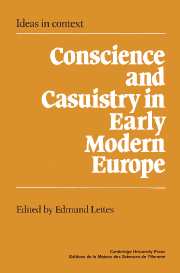Book contents
- Frontmatter
- Contents
- Notes on contributors
- Introduction
- 1 Governing conduct
- 2 Laxity and liberty in seventeenth-century English political thought
- 3 Casuistry and character
- 4 Prescription and reality
- 5 The ‘new art of lying’: equivocation, mental reservation, and casuistry
- 6 Kant and casuistry
- 7 Moral arithmetic: Seven Sins into Ten Commandments
- 8 Optics and sceptics: the philosophical foundations of Hobbes's political thought
- Index
1 - Governing conduct
Published online by Cambridge University Press: 13 October 2009
- Frontmatter
- Contents
- Notes on contributors
- Introduction
- 1 Governing conduct
- 2 Laxity and liberty in seventeenth-century English political thought
- 3 Casuistry and character
- 4 Prescription and reality
- 5 The ‘new art of lying’: equivocation, mental reservation, and casuistry
- 6 Kant and casuistry
- 7 Moral arithmetic: Seven Sins into Ten Commandments
- 8 Optics and sceptics: the philosophical foundations of Hobbes's political thought
- Index
Summary
INTRODUCTION
This is a working chapter. The claims it embodies are provisional and tentative. The hypothesis laid out in the chapter is that a new practice of governing conduct was assembled in the period from the Reformation to the Enlightenment. My aim is to describe this ensemble of power, knowledge, and habitual behaviour at the point, 1660–1700, when its relatively enduring features consolidated, and from the perspective of one person who described, evaluated, and partly constructed it John Locke. This mode of governance links together probabilistic and voluntaristic forms of knowledge with a range of techniques related to each other by a complex of references to juridical practices. Its aim is to reform conduct: to explain and then deconstruct settled ways of mental and physical behaviour, and to produce and then govern new forms of habitual conduct in belief and action. Finally, this way of subjection, of conducting the self and others, both posits and serves to bring about a very specific form of subjectivity: a subject who is calculating and calculable, from the perspective of the probabilistic knowledge and practices, and the sovereign bearer of rights and duties, subject to and of law from the voluntaristic perspective. The whole ensemble of knowledge, techniques, habitual activity, and subject I will provisionally call the juridical government.
Aspects of this have been studied by Michel Foucault in Surveiller et punir: naissance de la prison (1975). He isolated and distinguished two complexes of power and knowledge, the juridical and the disciplinarian.
- Type
- Chapter
- Information
- Conscience and Casuistry in Early Modern Europe , pp. 12 - 71Publisher: Cambridge University PressPrint publication year: 1988
- 24
- Cited by



